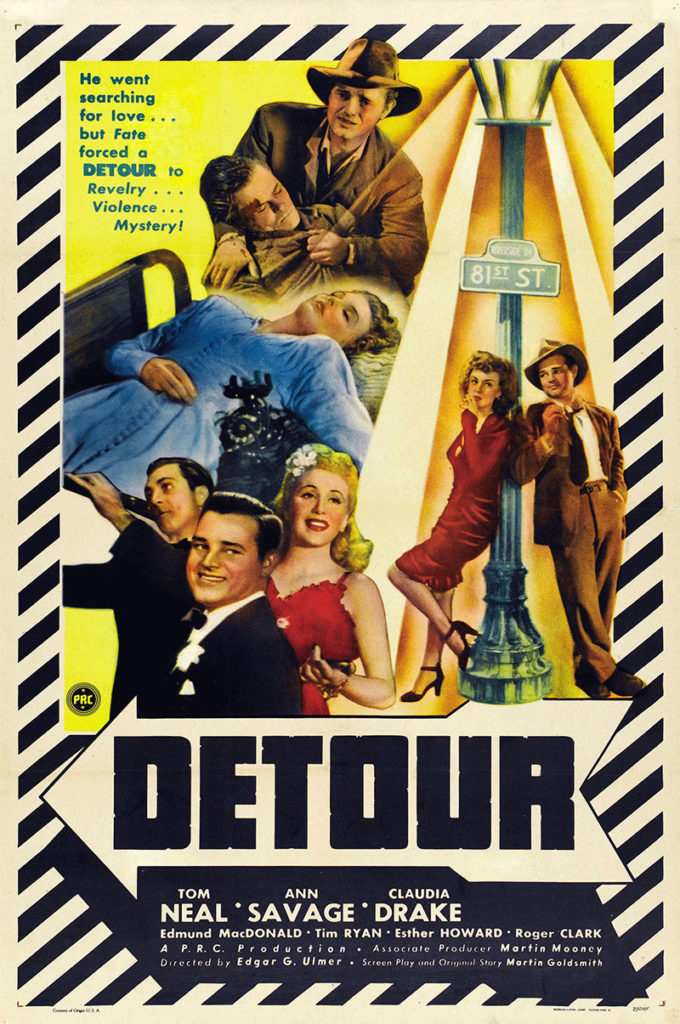What viewers have with Detour, the 1945 flick from screenwriter Martin Goldsmith (adapting his own novel) and director Edgar G. Ulmer, is drive-in schlock disguised as film noir.
Tom Neal plays Al Roberts, a nightclub piano player in New York City. He’s in a relationship with singer Sue Harvey (Claudia Drake). She gets bitten by the California bug and leaves New York to try and make it big in Los Angeles. Not long after, Al, penniless and unhappy with playing in clubs, decides to hitchhike across the country to join his love in sunny LA.
I didn’t think it was possible, and it’s nothing I’ve ever seen in film before, but the New Yorkers in this film are the stereotypical naïve country bumpkins who have dreams of becoming Hollywood stars. Misters Ulmer and Goldsmith didn’t seem to have that high of an opinion of their fellow urbanites from the other side of flyover country.
Somewhere in Arizona, Al is picked up by east coast bookie Charles Haskell (Edmund MacDonald), who is on his way to LA to lay down a pile of cash on a horse race. But, during a roadside stop in the middle of a driving rainstorm, Haskell is accidentally killed. It’s no fault of Al’s, but he knows what the situation would look like to the cops, so he decides to assume Haskell’s identity for as long as it takes to make it to LA, where he will ditch the car and forget everything that happened. This was possible back in the ’40s, as there were no photographs on a driver’s license, and Al had a similar height and built to Haskell.
However, Al makes the mistake of picking up another hitchhiker. She is Vera, played by Ann Savage in a performance so hammy, a viewer can hear the snorts and squeals if they listen closely.
Vera doesn’t believe for a second that Al is really Charles Haskell. That’s because, in an outlandish coincidence, Vera had been picked up by Haskell at some point during her own cross-country trip. Vera and Haskell didn’t get along, so she isn’t sorry that he’s  dead. Nor does she want to turn Al into the cops. Rather, she sees coming across Al as an opportunity. She forces Al into a criminal partnership, with big plans to grift their way all over Los Angeles.
dead. Nor does she want to turn Al into the cops. Rather, she sees coming across Al as an opportunity. She forces Al into a criminal partnership, with big plans to grift their way all over Los Angeles.
At this point, a film with real ambition and a respectable budget could go in all sorts of directions. There could be a Bonnie and Clyde relationship, or something subtler. There could be scenes of Al living a double life with both Vera and Sue, but Sue made her last appearance in this flick way back in New York City. What viewers get instead is scene after scene of Ann Savage chewing up dialogue and spitting it back out in the most clichéd and over-the-top ’40s tough girl I’ve ever seen. She’s got big plans, see? And Al had better toughen up and get on board or it won’t go well for him, see? Her tone and inflection would have gotten on my nerves if it weren’t so earnest and precious. She was trying so hard to act well. It didn’t work, but Ms. Savage will definitely be up for a Shitty Movie Sundays award next March.
Unfortunately, Vera and Al never really do anything else but sit around and talk. All these scenes happen in the car or in seedy hotel rooms. The plot never moves forward — any promised crime spree remaining a distant dream.
Detour has a running time of only 68 minutes, so not much could happen at all. But, viewers can also tell that the movie has been cut. Some scenes end with either Vera or Al about to open their mouths and say more lines, only for the shot to fade to black and on we go to the next scene. It’s hard to believe, but this flick could have been even more talky. That short runtime, then, is a blessing. It’s the lack of forward motion that dooms this movie in my eyes. It was a successful film upon release, and also got good reviews. It must have been a slow time at theaters. This film stinks, but Ann Savage’s performance is shitty gold. Alien: Resurrection is a better movie than Detour.
